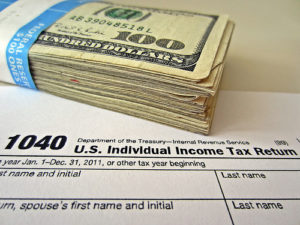We never make tax deposits for our small business because we don’t know what we’ll owe.
We just wait til the return is prepared and try to pay then, he explained.
But, again this October, he couldn’t write a tax check for a year’s worth of income.
So the client sitting across the table from me had an $8,000 tax bill for last year, and in mid October, had made no deposits toward this year’s taxes.
Waiting for certainty about what he’d owe, he racked up penalties for not making advance deposits, penalties for not paying when the return was filed, and interest on the unpaid tax.
And he was positioned to do it again this year.
Ouch!
Quarterly tax deposit trap
I’m sure the provision that the self employed make quarterly deposits, rather than more frequently, was thought to be a convenience for small business.
Instead, in my opinion, it is a trap.
It calls on entrepreneurs to estimate what they’ll owe, set money aside as it comes in, and, every three months, have enough money on hand to cover the check for the taxes.
That’s often a tall order for the self employed, who wear lots of hats and juggle lots of responsibilities in their business.
And it’s costly and uncomfortable when you don’t manage to do it.
Replace the quarterly tax deposit
Discard the quarterly tax deposit. Instead, make a monthly tax deposit.
Treat income taxes as one more regular, monthly expense of being in business.
Deal with current year taxes each month so you don’t have to save up the money to cover the tax bill.
How much tax to pay
Start with your tax liability for last year. Deposit 1/12 of that amount each month toward your current year taxes.
Write on the check your tax ID number, and a notation that the check represents estimated [current year] tax liability.
As the year goes on, you can estimate how this year’s income compares to last year and adjust that monthly check up or down as the facts suggest.
Breaking the tax delinquency cycle
For the man in my office, I had this suggestion: rather than paying $1000 for last year, when you’ve paid in nothing for this year, split up the money available for taxes.
Make a smaller payment toward the already delinquent taxes, say $250; pay $750 toward the current years taxes.
It’s already October, so he probably can’t pay in enough to avoid all penalties for being underwithheld for this year, but it’s a start on changing his ways and paying less in tax penalties in the future.
More on taxes
When taxes are dischargeable in bankruptcy
Image courtesy of Flickr and 401(k) 2013






